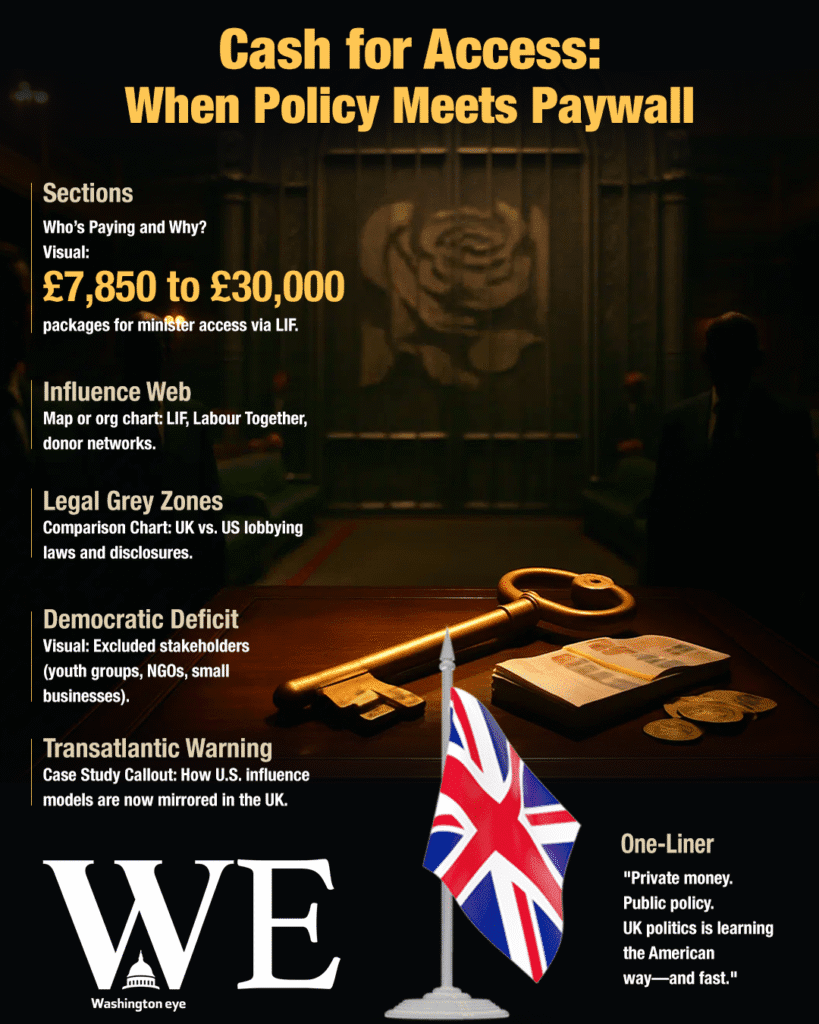As Britain nears a potential Labour government, questions are emerging not just about what policies will be enacted, but how those policies are being shaped and by whom. At the center of this growing concern is the Labour Infrastructure Forum (LIF), a think tank with strong ties to the party’s policy circles, now revealed to be offering corporate sponsorships that grant exclusive access to senior Labour figures.
Packages reportedly priced from £7,850 to over £30,000 promise private roundtables, receptions, and one-on-one meetings with influential MPs and ministers. These revelations, detailed in an investigation by The Guardian, suggest a growing ecosystem where policymaking is increasingly privatized, and available to the highest bidder.
Shadow Policy Circles and the Rise of Informal Influence
LIF’s model follows in the wake of Labour Together, another influential organization widely credited with shaping Keir Starmer’s policy agenda. Labour Together, although more public-facing, has drawn scrutiny for its close coordination with shadow ministers and its £1.5 million in donations to support select MPs. Now, LIF represents a more transactional phase: offering corporate sponsors direct access to shape dialogue on infrastructure, planning, and development with policymakers likely to assume power.
This evolving influence ecosystem blurs the line between policy formation and private funding. A sponsorship brochure obtained by The Times promised opportunities to “shape the discussion” with Labour officials, raising concerns that financial contributions may substitute for broad stakeholder consultation.
Regulatory Blind Spots and Democratic Implications
Current UK lobbying rules do not adequately capture think tank–facilitated access. As LIF is not registered as a lobbyist, and operates independently from Labour HQ, it avoids disclosure thresholds, yet serves the functional role of a lobbying conduit. The Office of the Registrar of Consultant Lobbyists (ORCL) and Electoral Commission have launched inquiries, but campaigners warn that the law remains ill-equipped for this new era of “outsourced influence”.
The democratic risks are serious: when access is mediated by sponsorship, smaller civic organizations and grassroots voices are crowded out. In such environments, policies on housing, transport, or urban planning may increasingly reflect the priorities of those who can afford to participate, not those most affected by the outcomes.
A Transatlantic Warning: U.S. Lessons in Influence
This model is not uniquely British. In the United States, think tanks like the Heritage Foundation and Center for American Progress have long served as soft power engines for corporate influence. Donor-sponsored briefings, white papers, and closed-door forums are common in Washington, often shaping legislation before it reaches the floor.
The UK now appears to be adopting a similar approach, but without the legal infrastructure (like U.S. 501(c)(4) rules) that at least mandate some disclosures. Worse, the lack of regulation opens the door to foreign-linked entities and multinational corporate lobbying, particularly in sectors like finance, energy, and post-Brexit trade. As the UK repositions globally, firms with U.S. ties may see LIF-style access as a way to influence both British and transatlantic regulatory environments.
If this model becomes normalized, the UK may follow the U.S. down a path where policy is increasingly shaped in rooms inaccessible to the public, and where wealth becomes the gatekeeper of political participation.
Will Labour Draw a Line?
Labour has so far distanced itself from LIF, claiming it has no control over the group’s activities. However, public pressure is mounting for clearer ethical guidelines and transparency rules, not only for MPs, but for think tanks and consultancies that function as shadow policy networks. With Labour likely to form the next government, the question is whether it will reform these grey zones, or continue benefiting from them in power.
Without stronger rules on political access and disclosure, LIF may be a glimpse of what’s to come: a privatized policymaking culture, where democracy becomes an exclusive event.

















